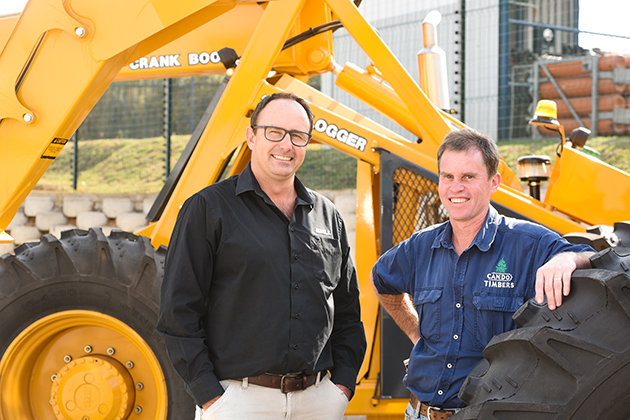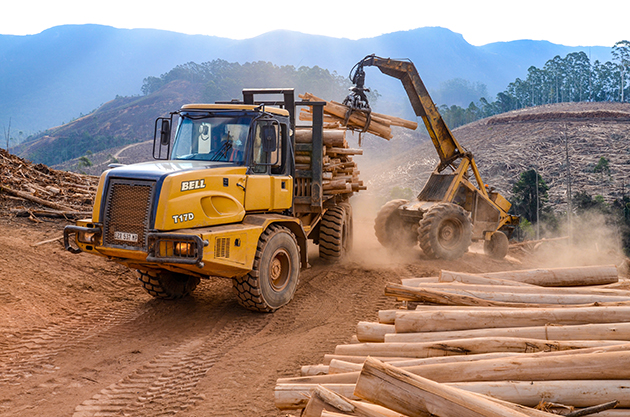Bell T17s have a long, productive life at Can Do Timbers
Published: 25 October 2018
It’s a well-proven fact that Bell Equipment’s Articulated Dump Trucks have been designed and built to withstand the rigours and challenges of working in some of the toughest conditions in the world.
Since those same design parameters have been built into a Bell T17 Articulated Timber Truck, it’s fair to expect similar results with longevity – nurtured by regular maintenance - a standout feature. This has been the experience that Cassie Greyling and his company Can Do Timbers have had ever since first buying Bell T17 Articulated Timber Trucks.
Can Do Timbers was founded in 2004 and since its humble beginnings the company has grown to be a major contract timber harvester for some of the largest timber growers. “We’re currently felling, extracting and doing short haul on mainly Eucalyptus compartments in two areas, one near Graskop and the other near Barberton,” Cassie explains when we meet in Nelspruit. “Some years ago, we did our planning so that we have a 60:40 split in favour of mechanised harvesting.”
This ratio translates into tree lengths of 4,2 metres being harvested mechanically while shorter lengths of 2,4 metres are harvested manually. “Having started with a small team of people harvesting manually, we value our personnel and the work they do and believe we still have a role to play in creating and sustaining employment,” Cassie says. “We do however also have clients who have huge demands for their product, hence our increasing mechanisation.”
Can Do Timbers a long association with harvesting and timber handling equipment manufactured, sold and maintained by Bell Equipment. The company deploys Bell 125 and Bell 225 Crank Boom Loggers, a John Deere 759 Harvester with a Waratah HTH616 Harvesting Head, a John Deere 1710D Forwarder and John Deere 540G Cable Skidders.
All this equipment can fell and extract timber from within the compartment to the roadside. Moving the timber to manageable depots where it can be loaded onto interlinked rigs for long haul remains a challenge especially in the areas with extreme inclines and slippery underfoot conditions found in the timber growing areas around Graskop and Barberton. High annual rainfall of up to 1 100mm makes this ideal terrain to grow timber but also causes dangerous conditions on gravel roads.
“Bell Equipment had a solution to this challenge as some years ago and we managed to buy seven Bell T17 Articulated Timber Trucks from a timber plant hire company that had ceased its operations,” Cassie explains. “This fleet had done high hours of between 26 000 and 30 000 but came with many spare components, engines and differentials. We’ve subsequently reduced our fleet of Bell T17 Articulated Timber Trucks to five which gives us the handy option to always have one truck as a spare should one need attention or servicing.”
Cassie lauds the design and build of the Bell T17 Articulated Timber Truck. With the trucks in his fleet now boasting hours of between 50 000 and 60 000, he and his team of six qualified mechanics have not picked up any cracks or signs of wear in the trucks’ chassis.
“The Bell T17 Articulated Timber Truck doesn’t have a normal suspension but a walking beam which absorbs much of the shock of the challenging roads we haul the timber on. However, the big advantage for us in getting our loads of timber safely to depots is the braking system on the Bell T17, which negates the steep declines where we carry full loads up to 16 tonnes,” he says.
“The truck has two built-in retarding systems which are automatically activated every time the operator takes his foot off the accelerator. The first is an engine braking system through an exhaust brake flap and an exhaust valve brake and the second is a transmission retarder, which has a torque converter that operates in reverse to slow the truck down. The operator can set the retarder strength.”
He further explains that should there be an engine failure the emergency steering hydraulic pump will aid steering and braking.
“Another reason why we simply cannot do without our fleet of Bell T17 Articulated Timber Trucks is their manoeuvrability around tight corners and at loading depots where space can be restricted,” he emphasises. “The truck’s ability to tip its load is simply great as this creates a reduction on cycle times.”
“Sustained mechanical availability should however never be taken for granted and we ensure that our operators, who generally drive for around eight hours in a ten-hour shift, diligently work through their daily checklists to ensure the trucks remain in good mechanical condition. Our own team of mechanics know these trucks intimately and ensure their uptime remains high.”
Can Do Timbers also run a Bell T302 Timber Truck, which has the added advantage of its own crane for loading and unloading, as it does not tip its load.
“Any fleet of mechanised equipment is only as good as its technical backup and we rely heavily on Bell Equipment’s Customer Service Centre in Nelspruit for this,” Cassie concludes. “Under the leadership of Charles Inggs who knows all about the challenges we face, the guys at Bell often make a plan to get parts to us quicker than most and that we appreciate.”

Charles Inggs (left) of Bell Equipment and Cassie Greyling.

